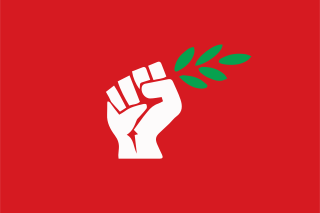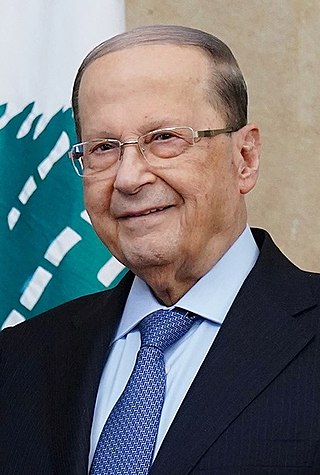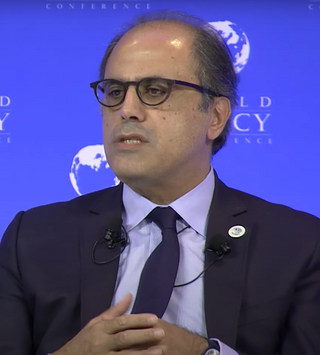
Michel Naim Aoun is a Lebanese politician and former general who served as the 13th president of Lebanon from 31 October 2016 to 30 October 2022.

The Free Patriotic Movement is a Lebanese political party. Founded by Michel Aoun in 1994, the party is currently led by Aoun's son-in-law Gebran Bassil since 2015.

Saad El-Din Rafik Al-Hariri is a Lebanese Turkish Saudi Arabian businessman and politician who served as the prime minister of Lebanon from 2009 to 2011 and 2016 to 2020. The son of Rafic Hariri, he founded and has been leading the Future Movement party since 2007. He is seen as "the strongest figurehead" of the March 14 Alliance.

The Future Movement is a Lebanese political party affiliated with the Sunni sect. The party was founded as a coalition in 1995 led by Rafic Hariri which was known as the Hariri Bloc but was officially founded in 2007. The party is led by Saad Hariri.
Along with the Amal Movement, Hezbollah is one of the two main parties representing the Shia community, Lebanon's largest religious bloc. Amal has made a commitment to carrying out its activities through political means, but remains a partial fighting force aiding Hezbollah when the need arises.

The March 14 Alliance, named after the date of the Cedar Revolution, was a coalition of political parties and independents in Lebanon formed in 2005 that were united by their anti-Syrian stance and by their opposition to the March 8 Alliance. It was led by Saad Hariri, Walid Jumblatt and Samir Geagea, as well as other prominent figures.

The 2006–2008 Lebanese protests were a series of political protests and sit-ins in Lebanon that began on 1 December 2006, led by groups that opposed the US and Saudi-backed government of Prime Minister Fouad Siniora and ended on 21 May 2008 with the signing of the Doha Agreement. The opposition was made up of Hezbollah, Amal, and the Free Patriotic Movement (FPM); a number of smaller parties were also involved, including the Marada party, the Lebanese Communist Party and the Syrian Social Nationalist Party. A majority of the members of the government were part of the anti-Syrian March 14 Alliance, a coalition of political parties and independents in Lebanon. The two groups were also divided along religious lines, with most Sunnis and Druze supporting the government, and most Shi'a supporting the opposition. The Christian community was split between the two factions, with Michel Aoun, the leader of the FPM, claiming to have more than 70% support among the Christians, based on the results of the 2005 parliamentary election.

The March 8 Alliance is a loose coalition of political parties and independents in Lebanon formed in 2005 that are united by their pro-Syrian stance and their opposition to the former March 14 Alliance. It was the ruling coalition in Lebanon with the government headed by Prime Minister Najib Mikati from June 2011 until March 2013. Main parties of the March 8 Alliance are part of the third Cabinet of Najib Mikati since 2021.

The Change and Reform bloc was a bloc in the Parliament of Lebanon that represented the Free Patriotic Movement and its allies, including the Marada Movement, the Tachnag Party, the Lebanese Democratic Party, and several independent deputies.

General elections were held in Lebanon on 6 May 2018. Although originally scheduled for 2013, the election was postponed three times in 2013, 2014 and 2017 for various reasons, including the security situation, the failure of the Parliament to elect a new President, and the technical requirements of holding an election. A new electoral law adopted in 2017 provides a proportional representation system for the first time.
Mario Aoun is a Lebanese physician and politician. He was a member of the Free Patriotic Movement (FPM) led by Michel Aoun. He was the minister of social affairs between 2008 and 2009.

Hikmat Dib is a Lebanese Maronite politician of the Free Patriotic Movement. He graduated from the Faculty of Engineering at Saint Joseph University. He was elected to a parliament in the 2009 Lebanese general election and in the 2018 Lebanese general election. He resigned from FPM on 1 March 2022, two months prior to the 2022 Lebanese general election.

The 17 October Protests, commonly referred to as the 17 October Revolution or Hirak, were a series of civil protests in Lebanon that began after the Lebanese cabinet announced financial measures on 17 October 2019. These national protests were triggered by planned taxes on gasoline, tobacco, and VoIP calls on applications such as WhatsApp, but quickly expanding into a country-wide condemnation of sectarian rule, the stagnation of the economy, unemployment, endemic corruption in the public sector, legislation that was perceived to shield the ruling class from accountability and failures of the government to provide basic services such as electricity, water, and sanitation.

Mar Mikhael Agreement is a memorandum of understanding signed on 6 February 2006 between the Christian Michel Aoun, the leader of the Free Patriotic Movement, and the Shiite Hassan Nasrallah of Hezbollah, in the Mar Mikhael Church in Haret Hreik, in Dahieh, Lebanon. The agreement established an alliance that influenced and changed the Lebanese politics since then, establishing the two parties' common goals, including helping Aoun getting to the presidency in 2016, and in return the FPM giving Hezbollah a Christian political support, and a cover for its military presence, including their 2006 War with Israel.

Alain Joseph Aoun is a Lebanese politician and former member of the Strong Lebanon bloc in the Lebanese parliament.

The Maarab Agreement is a highly secretive document signed between the leader of the Free Patriotic Movement Gebran Bassil, and the leader of the Lebanese Forces Samir Geagea at the latter's headquarters in Maarab, Lebanon on January 18, 2016, which requires Geagea, who had withdrawn from the presidential race, to endorse Michel Aoun's candidacy for the 2016 presidential elections, years after a long dispute that goes back to the Lebanese Civil War. The agreement paved the way for the election of Michel Aoun as president in October that year.

Ibrahim Youssef Kanaan is a Lebanese Maronite lawyer, politician and former member of parliament of the Strong Lebanon bloc.

Strong Lebanon is the parliamentary bloc of the Free Patriotic Movement and their allies in the Lebanese Parliament. Headed by Gebran Bassil, it consisted of 29 deputies after the 2018 general election and shrunk to 17 deputies after the 2022 Lebanese general election.

The 2022–2024 Lebanese presidential election is an ongoing indirect election to elect the president of Lebanon following the expiration of term-limited incumbent Michel Aoun's mandate on 31 October 2022. The outgoing president has served since 31 October 2016, following the end of the 2-year presidential crisis.

























